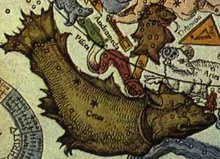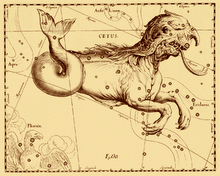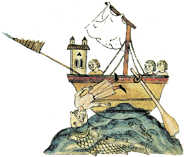I am really exhausted. I worked for several days straight after being attacked by a stomach virus that made it impossible for me to climb the stairs at Grand Central Station a couple of days ago. It felt like I had a tank of helium nestled between my solar plexus and diaphragm. Damn!
Then I went to the Ivory Tower, and let me tell you all, it is a walk through Oz. I missed the bonfire at this Presbyterian institution, all of my fellow coloureds didn't have a stomache for them, but I find beer and frat boys interesting. I never really experienced that world, but it did remind me of Tuebingen in a strange way.
And yesterday I picked up The New York Review of Books (November 30th, vol. LII, no. 19). I wanted to write a whole essay on this distinguished journal and the life it reminds me of, but with the onset of a graduate school application and the other things going on in my life, I don't have time to read the entire thing and write an essay that is tailored to my heart. So, I will write about what I have read so far.
I wonder if the Portuguese word saudade goes for terrible experiences as well as good ones. I think I am fascinated and in love with a struggle I have learned to recognize as part of
The review brings up that terrible symbiotic dysfunctional relationship of white folk and black folk -- that terrible assumption, which turns quickly into a need to help the Negro and my complicity in feigning helplessness. I was always thanked very graciously by the institutes that I roamed, re-shelved, interned at and performed minor tasks of maintenance on many a rainy Sunday afternoon in exchange for a piece of pauper’s bread and a place to sleep.
I look back at the mid to late nineties as part of a longer love affair with
The New York Review of Books of 2006 is a denatured landscape where not only its landmarks have been re-invented by fewer pagers, but its very components have changed like alchemical algebra. It has turned water into Italian soda – yes, it is a fountain in neoclassical style, but in a Willy Wonka land of intellectual proportions instead of a true reflection of the world we inhabit. It is Old Europe colored funny, not New Europe in shocking realism. Its perspective is ornate and wonderful to read, but its reach is not as curly and wavy as I once thought. It is just stubble unable to grow into a full beard.
The two articles I read dealt with two of my favorite subjects, Marie Antoinette and Gore Vidal.
Daniel Mendelsohn's "Lost Versailles" deals with Sofia Coppola's Marie Antoinette. Its opening is absolutely perfect making me remember why I loved the journal in the first place. I found Daniel Mendelsohn's observations to be pretty good, and he confirmed what I suspected about the movie.
As a pre -pubescent historian, I have wandered far away from Hollywood renditions of the past Can we really know what influence great men and women have had on any of us in two hours? I understand the artistic exercise in rendering the decomposed bodies of our exalted in the cinematic flesh, but to condense true life into plot sequences, or combine real life people into composite characters, always hurts me as a historian, even if I understand that narrative and voice can override such literal interpretations. So, to know that this was a meditation on how Maria Antonia became Marie Antoinette devoid of the complete political and social context outside of
Mendelsohn pours over Coppala's three films with a fine tooth comb. He lays out the ways of Coppala's lost women and ultimately he gives the good points and the bad points in unequal measure to Marie Antoinette. Coppala seems to focus on showing what life may have really been like for a girl plucked from Vienna to rule on the French throne at a time when all pomp was Parisian and all of Paris had an eye on Versailles. Antonia/Antoinette must master a new language, a court culture that was very different from the Hapsburg's and the quirks and intrigues of a family that was much different than her own. The thing that is not explored in detail is how this woman's very presence was meant to solidify an alliance between
I will say no more about Mendelsohn's review, but I will say this about the premise of the movie though I have not seen it (I know not a good thing). As a historian I think there is a problem in assuming that just because Marie Antoinette was a 14-year-old Austrian girl figuring out 18th century French politics that somehow her story holds resonance with the 21st century. I am not sure if this is a feminist project of re-imagining, but the leanings of Coppala's project are revisionist none-the-less upon the premise that it must have been extremely difficult for Marie-Antoinette in ways that would have been recognized by us. First that is not true, the idea of a teenager is a 20th century notion, and the ways of European royalty are an extreme experience that made people not owners of their own person but both the embodiment of the state power and subject to all the restraints that the role of governance require. In other words, she was probably expected to do what we would consider very adult things by the age of 14, and the strata she inhabited included re-occuring themes of fratricide and impersonal invasions of private life that are not kin to our world today, even for the most followed rock star.
I think Coppala addresses these issues, but I wonder if her interpretation of Antonia/Antoinette measures up to the past, I know that she wants it to be part of our present. I am probably better off reading Antonia Fraser's Marie Antoinette from which Coppala gets her rendition of the famous/infamous queen to answer these questions. But in the end, Marie Antoinette was not very bright. Even her tutor used to write her lessons on trace paper so she could print them out on clean sheets of paper to show to her mother the Empress Marie Theresa. Did she possess the most basic intellect to know the social crisises in that moment of history, or to take heed of her mother and brother’s caution? Is this shown in the film? I will have to wait and see, since I have taken on the task of reviewing the film before seeing it. Stay tuned.
Bits of Gore Vidal are expected in every New York Review of Books. He is the great pontiff of American letters who, with age, is moving in what seems like measured steps; or, maybe it is simply my own ex-patriot experience that has cloistered him from my view. It seems as if all of
Larry McMurty's introduction smacks of those lofty questions that only those in Vidal's caste can ask. Who cares if you had only one tomb to pick as your constant companion on a desert isle? Vidal's complete opus is McMurtry's obvious pick and from there we are transported to Vidal's latest installment and sequal to
But I am getting too poetic.
There is much less to say about Gore Vidal than the Marie Antoinette project, his mere presence in this journal is enough to summon up the picture of our contemporary court culture. Vidal is a well adorned mascot, beautiful in many ways, sensational in most other, larger than life, charming, astute and half American in his gleaming observation from the class of people that have always looked at America from their summer villa in Capri where the weather and temperament of the locals envelopes their bruised soles and blistered hearts from a spring and summer pounding the pavements of New York.
So, I am seeing this part of
In the same issues, Max Rodenbeck's piece "How Terrible Is It?" exclaims that the rest of the world was skeptical of our accusations directed to







No comments:
Post a Comment